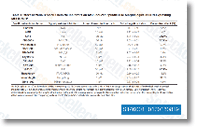Some big clinical centers are now starting to use much more compre hensive molecular profiling in clinical care. Even so, these assays vary with regards to breadth, depth and layout choice of the genes or inclu sion of the matched germline manage. As being a consequence, the clinical utility may perhaps differ. The Cancer Genome Atlas, a consortium centered on investigation and dis covery, sequenced the whole exome of tumors but at limited coverage depth, rejecting specimens with much less than 60% cellularity and avoiding the reputable identifica tion of subclonal mutations. More targeted commercial assays such as Basis 1 might generate elevated coverage depth of the smaller sized set of genes but usually do not usually report the mu tant allelic fraction.
Such diagnostic companies also omit the comparison that has a matched germline manage, that is critical to increase the analytical sensitivity and distin guish among inherited variants and somatic mutations. Ultra deep targeted sequencing of matched tumor germline specimens hasn’t but been evaluated in the clinical setting. The sequencing selleck chemical MS-275 of matched tumor germline samples is crucial to distinguish somatic mutations from sequencing artifacts, it’s also critical to establish with certainty that a variant recognized from the tumor is somatic rather then inherited considering that filtering towards polymorphism databases can do away with real muta tions. In the absence of a matched germline DNA se quence, the misinterpretation of an inherited variant for a somatic mutation could possibly protect against a patient from finding suitable genetic counseling.
Additionally, inhe rited variation in metabolism genes such as DPYD or CYP2D6 has been associated with 5 fluorouracil toxicity and probably tamoxifen efficacy, respectively, and, al however the variants are rare, a additional systematic clinical screening would present essential rewards. The simul taneous sequencing selleck chemicals on the germline DNA together with the tumor DNA for that reason provides technical rewards to iden tify somatic mutations at very low allelic fraction and increases the opportunity to recognize actionable inherited variants. Here, we evaluate a targeted sequencing assay for its use inside a cancer clinical setting. Specifically, we carried out UDT Seq of 47 genes which are clinically actionable or im portant for patient care. We display that possibly import ant details is acquired by sequencing at high depth, such as identification of subclonal mutations.
Further details is additionally gained from the sequencing of matched germline DNA and from your inference of tumor DNA copy amount alterations. We consequently demonstrate  that in com parison with other large throughput sequencing solutions, UDT Seq of matched tumor germline DNA applied inside a clin ical setting generates much more potentially actionable findings for a greater amount of patients.
that in com parison with other large throughput sequencing solutions, UDT Seq of matched tumor germline DNA applied inside a clin ical setting generates much more potentially actionable findings for a greater amount of patients.
Aurora kinase B
Aurora kinase B was identified in humans by a polymerase chain reaction screen for kinases that are overexpressed in cancers
